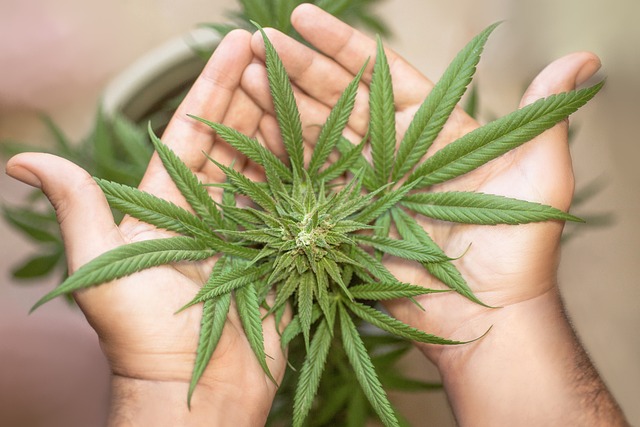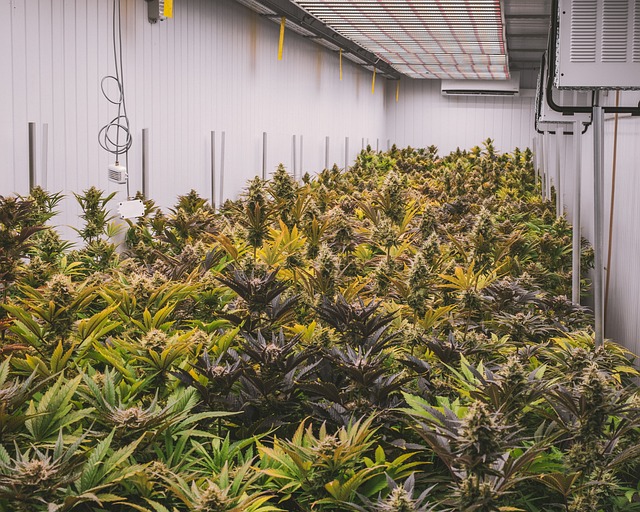THCA flower, a non-psychoactive compound from the cannabis plant, has been highlighted for its potential therapeutic properties, distinct from those of THC. Research suggests that THCA possesses anti-inflammatory, analgesic, and neuroprotective effects, which may be beneficial in managing chronic pain, inflammation, and conditions like arthritis, as well as offering support for neurological diseases such as Alzheimer's and Huntington's. These benefits are attributed to THCA's interaction with the endocannabinoid system's CB1 and CB2 receptors. It has also shown promise as an antiemetic agent, which could help alleviate nausea associated with chemotherapy or other conditions causing chronic vomiting. Ongoing research is crucial to further elucidate the full range of THCA flower effects and benefits within holistic health practices, emphasizing the need for careful dosage and professional consultation when exploring its use. The exploration of THCA flower's therapeutic potential continues to grow, with the cannabis research community actively investigating its role alongside or as an alternative to other cannabinoids in treating various health conditions.
explore the multifaceted impact of THCA (Tetrahydrocannabinolic Acid) flower, a non-psychoactive cannabinoid gaining attention for its therapeutic potential and benefits. This article delves into the chemical properties that distinguish THCA from its psychoactive counterpart, THC, and how these differences influence health and wellness. From its neuroprotective and anti-inflammatory effects to its role in gastrointestinal and respiratory health, the benefits of THCA flower are broad-ranging. However, as with any wellness product, users should be cognizant of potential side effects. This piece will address the key considerations for safe usage, including psychotropic effects, lung health concerns, and the risk of anxiety or paranoia. It also provides guidance on dosage, legal compliance, and how to integrate THCA flower into daily routines effectively. With a focus on high-quality product selection and understanding lab reports, readers will be well-equipped to navigate the world of THCA flower benefits and effects responsibly.
- Understanding THCA Flower: A Comprehensive Overview
- The Chemical Makeup of THCA and Its Implications
- Potential Therapeutic Benefits of THCA Flower Consumption
Understanding THCA Flower: A Comprehensive Overview

delta-9-tetrahydrocannabinolic acid (THCA) is a natural compound found in the cannabis plant. Unlike its well-known counterpart, delta-9-tetrahydrocannabinol (THC), THCA does not possess psychoactive properties. Instead, it interacts with the body’s endocannabinoid system, offering potential therapeutic effects and benefits that are distinct from those of THC. Research into THCA flower has revealed a variety of potential wellness applications, including anti-inflammatory, analgesic, and neuroprotective properties. These effects are attributed to THCA’s interaction with the CB1 and CB2 receptors in the endocannabinoid system, which can influence bodily functions ranging from pain sensation to immune responses. Consumers interested in the potential health benefits of THCA flower often report its use for conditions like chronic pain, inflammation, and various neurodegenerative diseases. It’s also being explored as a potential treatment for nausea and lack of appetite, conditions often associated with cancer treatments. As with any substance that impacts bodily systems, it is crucial to approach THCA flower with careful consideration of dosage and individual health needs, consulting with healthcare professionals when appropriate. The benefits of THCA flower are promising, but ongoing research continues to expand our understanding of its effects and potential applications within the realm of holistic health and wellness.
The Chemical Makeup of THCA and Its Implications

Delta-9-tetrahydrocannabinolic acid, commonly known as THCA, is a non-psychoactive precursor to the well-known cannabinoid THC found in the Cannabis sativa plant. The chemical makeup of THCA includes a carbon chain with various functional groups such as carboxylic acid, hydroxyl, and ketone groups, which are pivotal in determining its pharmacological properties. Unlike its isomer THC, THCA does not induce psychoactive effects; instead, it has garnered attention for its therapeutic potential. Preclinical studies have suggested that THCA may possess anti-inflammatory, antiemetic, and neuroprotective effects. These benefits stem from the interaction of THCA with the body’s endocannabinoid system, particularly the CB1 and CB2 receptors, which are involved in regulating mood, appetite, pain, and inflammation. As a result, THCA flower effects encompass a broad spectrum of wellness applications, including the management of inflammatory conditions and potential support for neurodegenerative diseases. The implications of THCA’s chemical structure highlight the importance of further research to fully understand its therapeutic applications and how it might differ from or complement THC and other cannabinoids found in cannabis.
Potential Therapeutic Benefits of THCA Flower Consumption

Consumption of THCA flower, which is the raw form of tetrahydrocannabinolic acid, has been associated with a range of potential therapeutic benefits. THCA, the non-psychoactive precursor to THC, interacts with the body’s endocannabinoid system and may offer various health advantages. Studies suggest that THCA possesses anti-inflammatory properties, which could be beneficial in managing conditions like arthritis and other inflammatory diseases. Its potential analgesic effects make it a subject of interest for those seeking natural pain relief without the psychoactive impact of its counterpart, THC.
Furthermore, preliminary research indicates that THCA may have neuroprotective qualities, which could be promising for individuals with neurodegenerative diseases. The compound has been observed to inhibit the progression of certain disease models associated with Alzheimer’s and Huntington’s, although more extensive human trials are needed to substantiate these findings. Additionally, THCA flower effects and benefits extend to its antiemetic properties, which could be beneficial for individuals undergoing chemotherapy or those suffering from chronic nausea and vomiting. As such, the therapeutic potential of THCA flower is an area of growing interest within the cannabis research community, with ongoing studies aimed at further elucidating its effects and benefits.
In wrapping up our exploration of THCA flower, it’s clear that this cannabinoid holds promise for a range of therapeutic applications. Its effects, distinct from those of its psychoactive counterpart, THC, warrant closer examination by researchers and healthcare professionals alike. While the benefits of THCA flower are promising, particularly in areas such as pain management and neuroprotection, it’s crucial to approach its use with caution and adhere to regulatory guidelines due to its potential side effects. Users should be aware that individual responses to THCA can vary, and thorough consideration of personal health factors is essential when integrating THCA flower into one’s wellness routine. As research continues to evolve, the full scope of thca flower effects and benefits will likely become clearer, providing valuable insights into its role in complementary and alternative medicine.
